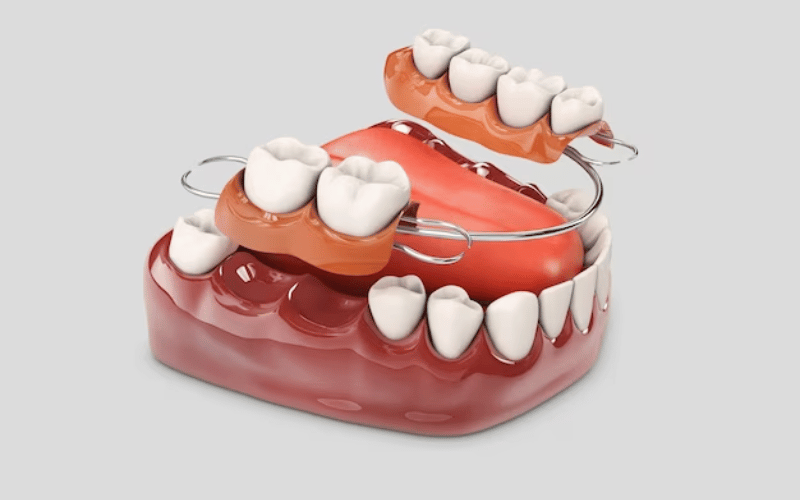Dental bridges are restorative devices that replace missing teeth, enhancing oral function and aesthetics. Consisting of artificial teeth anchored between adjacent natural teeth or dental implants, bridges bridge gaps caused by tooth loss. Traditional bridges are cemented to existing teeth, while implant-supported bridges attach to surgically embedded implants.
These prosthetics restore bite functionality, prevent teeth misalignment, and improve facial aesthetics. Regular oral hygiene is crucial for maintaining bridge longevity. Consulting a dentist ensures personalized solutions, promoting oral health and restoring a natural-looking smile.
Factors that affect the lifespan of dental bridges
1. Oral Hygiene Practices: Rigorous oral hygiene, including regular brushing, flossing, and professional cleanings, is essential. Poor hygiene can accumulate plaque and bacteria, increasing the risk of decay and gum disease and compromising the bridge’s longevity.
2. Material Quality: The materials used in the construction of dental bridges play a significant role. High-quality materials such as porcelain or ceramic are durable and resistant to wear. Opting for robust materials ensures better resistance to daily wear and tear.
3. Proper Fit and Alignment: Precise fitting and alignment of the dental bridge by a skilled dentist are crucial. Poorly fitted bridges may cause stress on surrounding teeth or lead to uneven bite forces, potentially affecting the bridge’s stability and durability.
4. Patient Habits: Habits like teeth grinding (bruxism) can exert excessive force on the bridge, leading to damage over time. Dentists may recommend a nightguard to protect the bridge for those with bruxism.
5. Underlying Oral Health Conditions: Existing oral health issues, such as gum disease or tooth decay in neighboring teeth, can impact the longevity of dental bridges. Addressing and managing these conditions is vital to ensure the oral environment’s overall health and the bridge’s stability. Regular dental check-ups help identify and address any emerging problems promptly.
The average lifespan of different types of dental bridges
The lifespan of dental bridges can vary based on several factors, including the type of bridge, materials used, oral hygiene practices, and individual patient factors. On average:
1. Traditional Bridges (Fixed): With proper care and maintenance, traditional fixed bridges can last 5 to 15 years or more. The longevity depends on factors like oral hygiene, wear and tear, and the health of supporting teeth.
2. Implant-Supported Bridges: Implant-supported bridges tend to have a longer lifespan, often lasting 15 years or more. Dental implants provide a stable foundation, and their durability contributes to the overall longevity of the bridge.
3. Maryland Bridges (Resin-Bonded): Maryland bridges, which involve minimal tooth alteration and use metal or porcelain wings for support, may have a lifespan of 5 to 10 years. Longevity can be influenced by factors such as the bonding strength and the health of the supporting teeth.
4. Cantilever Bridges: Cantilever bridges, anchored on one side, may have a lifespan similar to traditional bridges, ranging from 5 to 15 years, depending on various factors.
It’s important to note that these are general estimates, and individual cases can vary. Regular dental check-ups, good oral hygiene practices, and promptly addressing emerging issues can contribute to extending dental bridges’ lifespan.
Tips to increase the lifespan
Proper care is crucial for maintaining the longevity of a dental bridge. Here are vital steps to ensure the well-being of your dental bridge and overall oral health:
1. Oral Hygiene: Brush your teeth at least twice daily using a soft-bristled toothbrush and fluoride toothpaste. Floss between your natural teeth and around the bridge to remove plaque and prevent decay. Consider using an interdental brush or a floss threader for easier access
Also Read: What are the signs of poor oral hygiene?
2. Regular Dental Check-ups: Schedule regular dental appointments for professional cleanings and examinations. Your dentist can monitor the bridge’s condition, identify potential issues early on, and address any concerns.
3. Avoid Hard and Sticky Foods: Limit the consumption of hard or sticky foods that exert excessive force on the bridge or contribute to its damage. Chewing ice, hard candies, and similar items should be avoided.
4. Use a Mouthguard for Bruxism: If you grind your teeth (bruxism), especially at night, wearing a custom-made mouthguard can help protect your dental bridge and natural teeth from excessive force.
5. Limit Sugary and Acidic Foods: Reduce the intake of sugary and acidic foods and beverages. These can contribute to decay and compromise the bridge’s integrity and surrounding teeth.
6. Quit Smoking: If you smoke, consider quitting. Smoking can contribute to gum disease and compromise oral health, affecting the lifespan of dental restorations.
7. Maintain Overall Health: Systemic health is closely linked to oral health. Adopt a healthy lifestyle, including a balanced diet, regular exercise, and adequate hydration to support your overall well-being, including your teeth and gums.
8. Address Issues Promptly: If you notice any changes, discomfort, or damage to your dental bridge, consult your dentist promptly. Early intervention can prevent more significant problems and extend the bridge’s lifespan.
By following these guidelines and maintaining good oral hygiene practices, you can contribute to the longevity and effectiveness of your dental bridge. Regular communication with your dentist is essential for personalized care and addressing specific concerns.
In conclusion, diligent care is paramount for the longevity of dental bridges. Adopting a thorough oral hygiene regimen, regular dental check-ups, and mindful dietary choices safeguards these restorations. Avoiding habits like teeth grinding and promptly addressing issues ensures sustained oral health.
DNA Dental Studio in Burbank stands out for residents seeking expert dental care. Renowned for its commitment to precision and patient well-being, DNA Dental Studio in Burbank specializes in crafting durable and aesthetically pleasing dental bridges.
Through attentive care and professional guidance, DNA Dental Studio is dedicated to enhancing smiles and promoting enduring oral health in the Burbank community.


